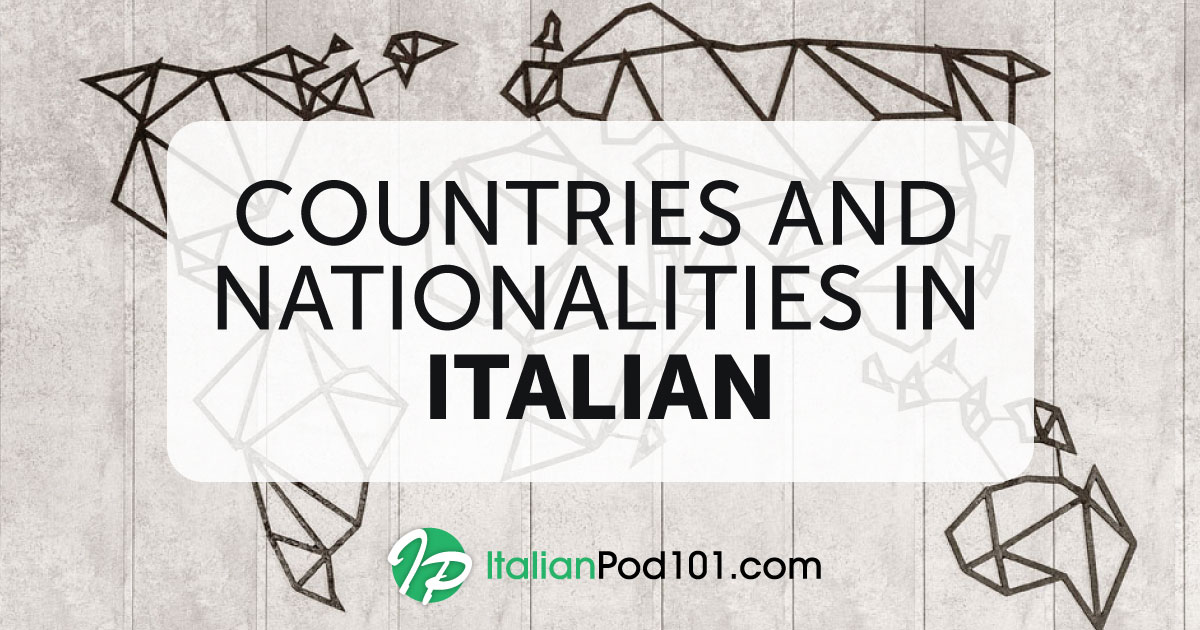Archive for the 'Italian Grammar' Category
December 6, 2019
Learn All the Terms for Family in Italian
Family is a vital institution everywhere in the world, but particularly in Italy. It’s not a cliche: Italians love their family, A LOT. And even if things have changed over the last few decades and huge, extended families aren’t as common as before, Italians still feel a connection toward their family members that’s hard to find in other Western countries.
But then, who doesn’t love their mom and dad, their grannies or little children, and doesn’t feel the need to talk about them with friends? As stated before, Italian extended families are greatly valued in Italian society, so knowing how to talk about them is essential. That’s why we’ve written this guide on how to talk about family in Italian.
Here at ItalianPod101, you’ll learn the... Show more
November 21, 2019
The Essential Italian Phrases for Travel
Traveling is wonderful. You get to know new places and ways of life, meet different people, and relax—far from your usual routine. Regular contact with a new language is another huge plus. And when you travel, you can learn that language in the most fun and interesting way.
Nevertheless, you should still know a few important phrases before jumping on a plane and heading for a new country. If that country is Italy, there’s even more reason to learn some phrases in advance; we’ll explain why in a bit.
Ready to learn Italian travel phrases, and other Italian phrases about travel?
Welcome to ItalianPod101’s guide to Italian phrases for travel!
Table of Contents
Why it’s Important to Know a Few Phrases when Traveling
Do Italians... Show more
October 9, 2019
How To Post In Perfect Italian on Social Media
You're learning to speak Italian, and it's going well. Your confidence is growing! So much so that you feel ready to share your experiences on social media—in Italian.
At Learn Italian, we make this easy for you to get it right the first time. Post like a boss with these phrases and guidelines, and get to practice your Italian in the process.
1. Talking about Your Restaurant Visit in Italian
Eating out is fun, and often an experience you'd like to share. Take a pic, and start a conversation on social media in Italian. Your friend will be amazed by your language skills...and perhaps your taste in restaurants!
Matteo eats at a restaurant with his friends, posts an image of it, and leaves this comment:
POST
Let's break down... Show more
September 12, 2019
How to Say “I’m Sorry” in Italian
Learning how to say “I’m sorry” in a foreign language is a crucial step in assimilating not only its grammar and vocabulary, but also its culture. This is why we at ItalianPod101 have decided to write an extensive guide about how to say sorry in Italian.
Reading this article, you’ll discover how to say “I’m sorry” in Italian with your words and with your body language. Moreover, you’ll find out how to say sorry in Italian in different circumstances and to different people.
Everyone makes mistakes from time to time. Don’t let them devastate your relationships with your Italian friends, relatives, colleagues, or other special people in your life. Learn how to say “I apologize” in Italian in the most effective way and take care of your... Show more
February 21, 2018
5 Techniques of Successful Italian Learners
Some Italian learners progress more quickly than others. Is this because they’re smarter, more talented, or maybe just lucky? In some cases perhaps. Most of the time though, a lot of what determines your success in a language is a) the amount and consistency of time you put into it; and b) the way that you go about practicing it.
In this post we’ll take a look at 5 practical techniques that you can use to learn Italian successfully.
1. Hit the Easy Targets
Italian comes from the family of the Romantic languages. Romantic languages have deep Latin roots. English has also been influenced by Latin (though not quite as much). Latin isn’t the only language to influence European languages. Greek also had a huge part to play. Also... Show more
December 25, 2008
Happy Holidays and Happy New Year From ItalianPod101.com!
Happy Holidays and Happy New Year from everyone here at ItalianPod101.com! We're grateful to have listeners just like you, and we're eagerly waiting for the upcoming year to learn Italian together!
And when the New Year comes around, be sure to make a resolution to study Italian with ItalianPod101.com!
Have a healthy and happy holiday season.
From the ItalianPod101.com team!









